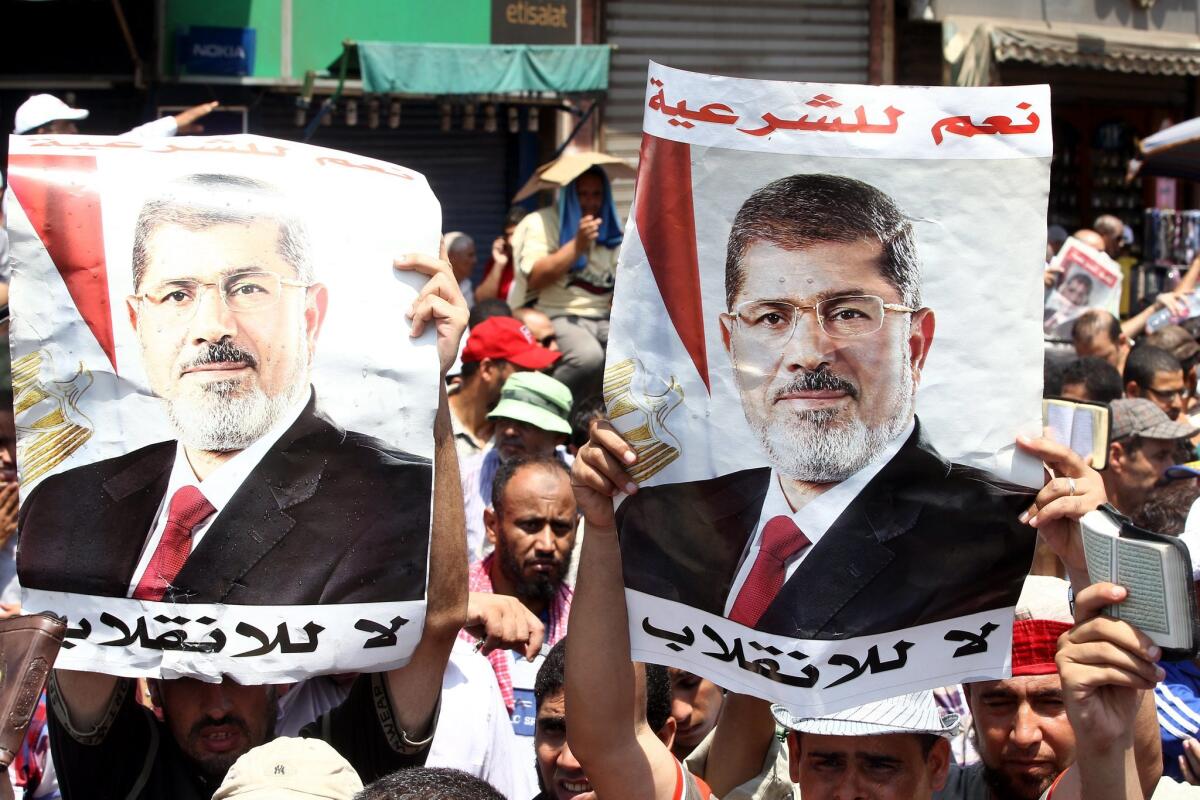Egypt crisis: U.S. envoy meets with jailed Muslim Brotherhood leader

CAIRO -- International efforts to resolve Egypt’s political crisis have intensified, including a prison meeting early Monday between U.S. Deputy Secretary of State William J. Burns and a leader of the Muslim Brotherhood who faces murder charges stemming from weeks of clashes.
U.S. attempts to calm Egypt’s unrest following a military coup last month that overthrew the Islamist president, Mohamed Morsi, were bolstered by the arrival in Cairo on Monday of Sens. John McCain (R-Ariz.) and Lindsey Graham (R-S.C.). They were expected to meet with members of the interim government and Gen. Abdel Fattah Sisi, commander of the armed forces.
More than 200 people have died in recent weeks in a political showdown between the military-backed government and supporters of Morsi and his Brotherhood movement. Thousands of pro-Morsi protesters have refused to leave their sit-in at the Rabaa Al Adawiya mosque until the ousted president is reinstated.
It is not certain how much influence the United States, which gives the Egyptian military $1.3 billion in annual aid, may have in resolving the standoff. The Brotherhood and the military are increasingly suspicious of the Obama administration, whose policies here are often described by officials as erratic and self-serving.
The crucial test facing international envoys -- including diplomats from Europe, Qatar and the United Arab Emirates -- is convincing the Brotherhood, which believes its fairly elected president was illegally removed from office, to abandon its protests and rejoin the political process. The Brotherhood has demanded that the military relinquish power and the new government be dissolved.
Burns and other diplomats reportedly met in Tora prison with Khairat Shater, the Brotherhood’s chief strategist and financier. Details of the meeting were not disclosed. International officials were also expected to meet with Saad Katatni, the head of the Brotherhood’s political wing, who is also in jail.
Egypt’s Ahram Online news website reported that Shater and foreign mediators “have offered a prospect for a deal that could ‘reduce political heat’ and ‘avert further violence and bloodshed.’”
But the Brotherhood, at least publicly, appears not to be backing down. The group’s spokesman, Gehad Haddad, tweeted after the envoys’ meeting with Shater:
Both @ahramonline & @Independent stories of negotiations & deals r fictional. Our position of full reversal of #Military_Coup is unchanged.— Gehad El-Haddad (@gelhaddad) August 5, 2013
The government has been just as adamant in its position. It reiterated Monday that it would not alter the army’s “political roadmap,” which calls for amending the Islamist-drafted constitution and holding parliamentary elections in early 2014. The army and police have urged protesters to evacuate from their tent city at Rabaa Al Adawiya and are expected to impose a security blockade around the area.
Pressure from human rights groups and foreign capitals has so far helped prevent a storming of the sit-in by security forces. Police had threatened such a move last week, but with many women and children at the sit-in, they have appeared to give mediation a chance. Security officials said Sunday, however, that their patience was not unlimited.
The Brotherhood has questioned how it can successfully negotiate with a government that has arrested hundreds of its members, frozen its financial assets, shut down its television stations and called its followers terrorists.
“This is the source of the situation’s complexity,” said Sayed Amin Shalabi, executive director of the Egyptian Council for Foreign Affairs. “The Muslim Brotherhood’s argument is how can you call for reconciliation when our leaders are standing trial?”
Morsi has been held at an undisclosed location by the military. He has been charged with espionage and other charges over allegations that he conspired with the Palestinian militant group Hamas. The accusations are widely regarded as politically motivated, but the Brotherhood’s insistence that the former president be returned to power is a non-starter for the government.
The charges against Shater are also seen as an effort to weaken the Brotherhood and relegate it to the political margins. Shater and other Brotherhood members face trial this month for allegedly inciting deadly clashes outside the organization’s headquarters in the days just before the coup.
ALSO:
Syria firing missiles into civilian areas, rights group says
Turkey’s former military chief sentenced to life in prison
Lab-grown burger from stem cells introduced: Looks good, tastes blah
Twitter: @JeffreyLAT
Hassieb is a special correspondent.
More to Read
Sign up for Essential California
The most important California stories and recommendations in your inbox every morning.
You may occasionally receive promotional content from the Los Angeles Times.











